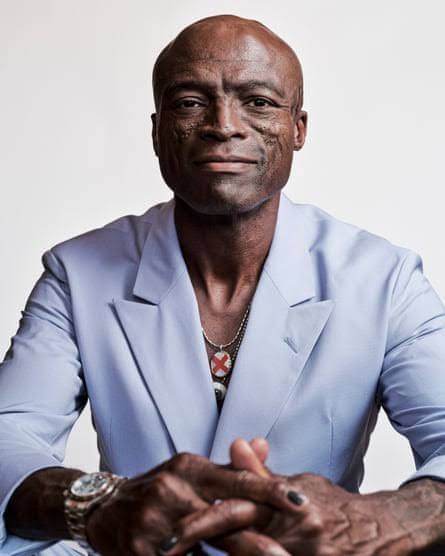Henry Olusegun Olumide Adeola Samuel, better known by his stage name Seal, is a British musician, singer, songwriter, and record producer. He has sold over 20 million records worldwide.
These include hit songs “Crazy” and “Killer”, the latter of which went to number one in the UK, and his most celebrated song, “Kiss from a Rose”, which was released in 1994. Seal is renowned for his distinctive soulful singing voice.
Seal was born at St Mary’s Hospital in Paddington, London, to a Nigerian mother, Adebisi Ogundeji, and an Afro-Brazilian father, Francis Samuel.
Seal has won multiple awards throughout his career, including three Brit Awards; he won Best British Male in 1992. He has also won four Grammy Awards and an MTV Video Music Award. As a songwriter, Seal received two Ivor Novello Awards for Best Song Musically and Lyrically from the British Academy of Songwriters, Composers and Authors for “Killer” (1990) and “Crazy” (1991).
He was a coach on The Voice Australia in 2012 and 2013, and returned to Australia to work as a coach in 2017.
While Seal remains an active songwriter, performer and producer, he has also dabbled in film.
He was the voice of “Seal Seal” in the animated film Seal Team(2021) and played “Pontius Pilate” in Tyler Perry’s tv movie The Passion (2016). His latest film project was a role in the 2022 movie Me Time.
His facial scars have been a point of conversation since he hit the music scene in the 1990s. From there, more than one story began to circulate, all making up tall tales of how the Grammy Award-winning artist got his scars.
During an interview with Entertainment Weekly, Seal set the record straight.
“People always want them to be tribal scars. That’s just the nature of the media and of people’s imaginations.” The scars aren’t from a ritual or from an accident.
The scarring on Seal’s face is the result of a type of lupus called discoid lupus erythematosus(DLE), which is an autoimmune skin disease that affects the skin and leaves large scars.
Seal has revealed in interviews that he was afflicted with this syndrome as a teen and diagnosed with DLE at the age of 21.
Not only did DLE cause Seal’s face scars, but he had significant scalp involvement, causing hair loss the singer’s condition has been in remission for years, though his scars remain.




